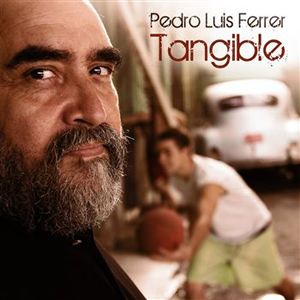Reviews June 14, 2011
Tangible
Don’t be alarmed if Pedro Luis Ferrer’s name doesn’t ring a bell. Despite being a beloved songwriter in his native Cuba, renowned for his social and political criticism, the number of albums he’s released there stands at a meager three, all of which are decades old. Castro’s regime banned Ferrer’s music from state airwaves in the 90s, forcing him to keep his music underground, until finally re-emerging in 2005 to release studio material once again, this time in the US. His third stateside release, Tangible, showcases the next evolution of Ferrer’s original “changüisa” style, which is rooted in changüí, a century-old folk music from the mountains of eastern Cuba.
These roots announce themselves right from the first beat of “Corazón,” the album’s opening track, as the plaintive minor-key syncopations of the tres accompany the sentimental refrain “Heart, why do you hurt so?” As typical as that sounds, though, it doesn’t take long for Ferrer to get into some more contemporary sounds, and the essence of changüisa becomes clearer as the album unfolds. “Venimos o Nos Vamos?”, the second track, also begins with the tres, but the sound is decidedly more Jorge-Drexler-in-Guantánamo than Buena Vista. Ferrer feels close to tradition, but he’s not a tied to it: Clave, coro (chorus), bongos, and tres are merely colors on his palette in painting his own musical world.
Ferrer is a completely self-taught musician whose unorthodox and inventive tres playing, along with his powerful voice, drives many of the songs on the album. And while the tres is the signature instrument of changüí and son, even longtime fans and Cuban music aficionados will be impressed at how much mileage Ferrer can get from it, from the colorful harmonies of “Aunque Se Caiga el Cielo” and the brooding chords of “Pajarillo” to the downright virtuosic solo on “En la Luna.”
However, Tangible falters when the tres takes a backseat. The title track, whose thick arrangement features piano, guitar, and horns, is one of the weakest of the bunch, because it clashes with the light and breezy back-porch feel that runs through the album. Even worse, the piano and horns sound digital, as if they were an afterthought in the studio. A flute or clarinet would have fit in much better alongside the tres. That said, the majority of the album is a joy to listen to— a fresh, intelligent, and unconventional take on Cuban music, from an equally unconventional songwriter who sings of love and nature one moment, and spins a verse on the lack of pork, chicken, and rum on the moon the next.
-Justin Douglas









